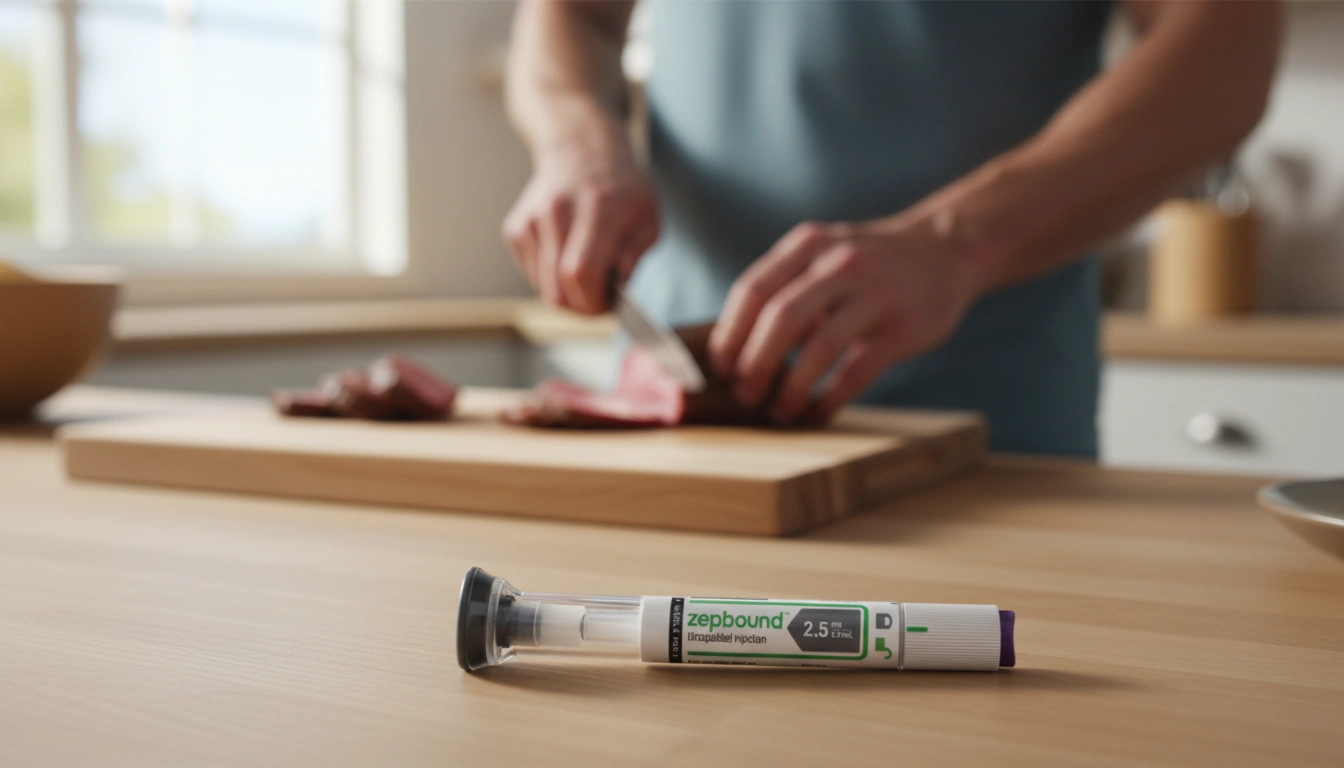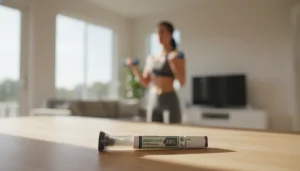How Many Calories Should I Eat on Zepbound for Effective Weight Loss?

Have you ever wondered how many calories you should consume while using a medication like Zepbound? Perhaps you've seen friends or family achieve remarkable transformations and are curious about the science behind their success. With obesity affecting nearly 49% of adults in the U.S. by 2030, understanding the nuances of weight management is more critical than ever. Zepbound, an innovative medication containing tirzepatide, is designed to help individuals manage their weight effectively. But how do we determine the right caloric intake to maximize its benefits while ensuring our health remains a priority?
In this blog post, we’ll dive into the relationship between Zepbound and caloric intake, exploring why understanding this balance is essential for weight loss success. We’ll cover the basics of Zepbound, its mechanism of action, recommended caloric intake, and practical dietary strategies to enhance your weight loss journey. By the end of this article, you will have a clear understanding of how to tailor your diet while taking Zepbound to achieve sustainable weight loss.
Introduction
The journey toward effective weight management is often filled with challenges, but the advent of medications like Zepbound offers new hope. Zepbound, which contains the active ingredient tirzepatide, has shown promising results in clinical trials for promoting significant weight loss. However, the success of this medication also hinges on dietary choices, particularly caloric intake.
Determining how many calories you should eat on Zepbound is not a one-size-fits-all answer; it varies based on individual factors such as age, sex, activity level, and specific health conditions. Understanding these nuances is vital for anyone looking to optimize their weight loss journey with Zepbound.
In this post, we will guide you through:
- An overview of Zepbound and its role in weight management.
- The importance of caloric intake while using Zepbound.
- Practical tips for meal planning and nutrient-dense food choices.
- How to monitor your progress effectively.
By exploring these topics, we aim to equip you with the knowledge necessary to make informed dietary choices while using Zepbound. Together, we can navigate this journey toward healthier living, emphasizing the importance of individualized care and support.
Understanding Zepbound
What is Zepbound?
Zepbound is an injectable medication that has gained attention for its effectiveness in aiding weight loss. It works by acting on two key hormones involved in appetite regulation: glucagon-like peptide-1 (GLP-1) and glucose-dependent insulinotropic polypeptide (GIP). These hormones help control hunger signals and promote feelings of fullness, making it easier for individuals to reduce caloric intake without experiencing extreme hunger.
How Does Zepbound Work?
Zepbound’s unique mechanism involves binding to GLP-1 and GIP receptors, which leads to several physiological responses:
- Appetite Suppression: By influencing appetite-regulating hormones, Zepbound helps to reduce cravings and overall food intake.
- Improved Insulin Sensitivity: The medication enhances the body's sensitivity to insulin, supporting better blood sugar control.
- Slowed Gastric Emptying: By slowing the rate at which food leaves the stomach, Zepbound prolongs feelings of fullness after meals.
These combined effects contribute to significant weight loss when Zepbound is used alongside a reduced-calorie diet and increased physical activity.
Determining Caloric Intake on Zepbound
Recommended Caloric Ranges
While Zepbound helps suppress appetite, it’s essential to maintain an adequate caloric intake to ensure you receive the necessary nutrients for overall health. Current guidelines suggest the following caloric ranges for individuals using weight loss medications:
- Women: 1,200 to 1,500 calories per day
- Men: 1,500 to 1,800 calories per day
These ranges may need to be adjusted based on factors such as metabolic rate, activity level, and individual health conditions. Consulting with a healthcare provider or registered dietitian can help tailor these recommendations to your specific needs.
The Importance of Individualization
One of the core values we hold at TrimRx is the belief in personalized care. Each individual’s journey is unique, and what works for one person may not work for another. Therefore, it’s crucial to take into account your body’s specific responses to Zepbound, as well as your lifestyle and dietary preferences.
Reflecting on your own experiences, consider the following questions:
- How does your body respond to different caloric intakes?
- Are there particular foods that satisfy your hunger while providing essential nutrients?
- What are your daily activity levels, and how do they influence your caloric needs?
By answering these questions and adjusting your caloric intake accordingly, you can create a plan that works best for you.
Practical Dietary Strategies for Weight Loss on Zepbound
Prioritize Nutrient-Dense Foods
While it may be tempting to reduce calories drastically, focusing on nutrient quality is vital. When on Zepbound, aim to consume a variety of nutrient-dense foods that provide essential vitamins and minerals, even in smaller portions. Here are some food categories to include:
- Lean Proteins: Incorporate sources like chicken, turkey, fish, tofu, and legumes. Aim for at least 60 grams of protein daily to support muscle maintenance.
- Healthy Fats: Opt for unsaturated fats found in nuts, avocados, and olive oil. These can provide satiety without exacerbating side effects like nausea.
- Complex Carbohydrates: Include whole grains, fruits, and vegetables that are rich in fiber, which can help regulate digestion and keep you feeling full longer.
Meal Planning Tips
Meal planning can be an effective way to ensure you stay within your caloric goals while also enjoying a variety of foods. Here are some practical tips for planning your meals:
- Balanced Plates: Aim to fill half your plate with non-starchy vegetables, a quarter with lean protein, and a quarter with high-fiber carbohydrates. This approach not only helps with portion control but also ensures a balanced intake of macronutrients.
- Frequent Eating Occasions: Consider having three to five smaller meals throughout the day rather than three large ones. This can help manage hunger and prevent overeating.
- Hydration: Staying hydrated is critical for overall health and can help curb unnecessary snacking. Aim for at least 64 ounces of water or other non-caloric beverages daily.
Monitoring and Adjusting Your Intake
As you embark on your journey with Zepbound, it’s essential to monitor your progress and adjust your caloric intake as needed. Here are some strategies to help you stay on track:
- Keep a Food Diary: Recording what you eat can help identify patterns, portion sizes, and areas for improvement.
- Regular Check-Ins: Schedule regular appointments with your healthcare provider or a registered dietitian to discuss your progress and make necessary adjustments to your meal plan.
- Listen to Your Body: Pay attention to hunger cues and energy levels. Adjust your caloric intake based on how your body responds.
Conclusion
Navigating the world of weight management can be complex, particularly when incorporating medications like Zepbound into your routine. Understanding how many calories you should eat on Zepbound is essential for maximizing its benefits while supporting overall health.
By prioritizing nutrient-dense foods, personalizing your caloric intake, and monitoring your progress, you can create a sustainable weight loss plan that aligns with your individual needs. Remember, we at TrimRx are here to support you every step of the way, providing a user-friendly platform for personalized care and resources tailored to your journey.
As you reflect on your weight loss goals, consider taking our free assessment quiz to see if you qualify for our personalized weight loss medications, including Zepbound. Remember to explore our quick-access supplements like GLP-1 Daily Support and Weight Loss Boost to enhance your journey as well.
FAQ
Can I eat normally while on Zepbound?
Over time, you may be able to return to a more typical eating pattern. However, it’s essential to focus on nutrient quality and avoid high-fat or sugary foods that may exacerbate Zepbound's side effects.
What happens if I eat too much on Zepbound?
Overeating can lead to stomach discomfort, indigestion, or bloating. It may also hinder your weight loss progress. Being mindful of portion sizes is crucial.
How much should I eat on Zepbound?
While individual needs vary, aim for 1,200 to 1,500 calories per day for women and 1,500 to 1,800 for men. Consult with a healthcare provider or dietitian for personalized recommendations.
How can I stay hydrated on Zepbound?
Aim for at least 64 ounces of water or non-caloric beverages each day. This will help manage hunger and support overall health.
Can a dietitian help me while on Zepbound?
Absolutely! A registered dietitian can work with you to develop a customized meal plan, helping you navigate any side effects and ensuring you consume sufficient nutrients.

Transforming Lives, One Step at a Time
Keep reading
Navigating Zepbound Dosing: Do I Have to Increase My Zepbound Dose for Effective Weight Management?
Do I have to increase my Zepbound dose? Learn why dose escalation is key for effective weight loss & how to manage side effects. Get expert guidance for your Zepbound journey.
Optimizing Your Journey: Why We Adjust Zepbound Doses for Effective Weight Management
Curious why you increase the dose of Zepbound? Discover the science behind dose escalation for optimal weight loss and minimal side effects. Learn more!
Understanding Zepbound Dosage: What’s the Max Dose and How Does It Fit Your Weight Loss Journey?
Curious what’s the max dose of Zepbound? Discover its dosage, escalation, and safety info for effective weight management. Get started on your journey!



